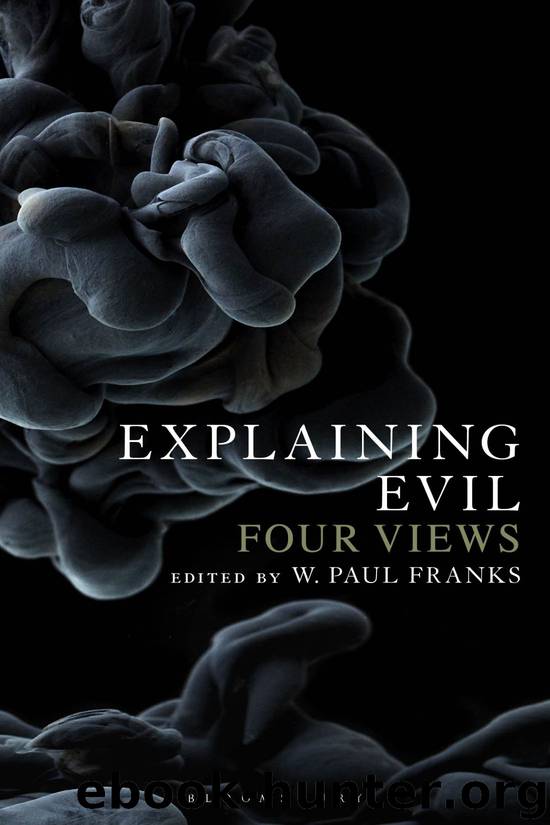Explaining Evil by W. Paul Franks

Author:W. Paul Franks
Language: eng
Format: epub
Publisher: Bloomsbury USA
Response to Michael Ruse
Richard Brian Davis
The “most important statement in this essay,” says Michael Ruse, is that “I believe in the existence of evil. I think some people are truly evil human beings” (83). Now I don’t doubt for a moment that Ruse believes these things. It’s just that on “the supreme theory” (92) (i.e., his all-purpose Darwinian Naturalism (DN)) what Ruse believes is actually false. There is no such thing as real evil and there are no truly evil human beings. We can see this in the following ways.
First, on Ruse’s view, there is no natural evil. “I don’t believe in it!” (85)) he says. There are simply “unpleasant things that happen to us,” (ibid.) and they are “part of the package deal” (98) if you’re a Darwinist. That’s fair enough. But then if evil exists at all, it will have to be moral evil—the sort (all too frequently) entertained or perpetrated by conscious, rational agents to deliberately cause or permit significant harm to be done to themselves or others without good reason. Clearly, to commit a moral evil, you must be a conscious agent. That’s the bare minimum.
But here I’m at a loss to see how “the supreme theory” delivers. We’re told that natural selection works on “the units of heredity,” (90) accumulates variations, and ultimately produces “new features that are helpful: adaptations like the hand and the eye, the leaf and the flower” (89). No one’s questioning that. The question is whether compounding these material parts in this material fashion could ever produce consciousness. It is no answer to reply, “By ‘consciousness’ I just mean ‘the material interactions between the brain’s material parts.’ Evolution can explain the origin and operations of these ‘neural machines.’” Certainly, but that’s not what consciousness is.
What I’m referring to is “the reflex act by which I know that I think, and that my thought and actions are my own and not another’s” (Clarke and Collins 2011, 90). That is accessible only through introspection. And when you carefully attend to that datum, it quickly becomes apparent that consciousness (in this sense) is utterly distinct from the known properties of matter. It’s a different kind of thing altogether. Indeed, it is so different that to fancy unconscious brain parts could conspire together to produce a conscious whole brain is to forget that what you’re picturing here is metaphysically impossible: that something can be produced out of nothing.1 Thus DN commits Ruse to denying a necessary condition for there being moral evil (the only sort he believes in). The “supreme theory” therefore commits him to denying evil itself.
Second, Ruse proposes that “the reality of moral evil . . . implies we have choice. We have free will” (91). He then goes on to say that “in thinking about free will and choice—and then subsequently about evil—we can do it from a Darwinian perspective” (90). If we do that, we can see that Heinrich Himmler was morally evil because he “had a choice and he chose to kill” (84).
Download
This site does not store any files on its server. We only index and link to content provided by other sites. Please contact the content providers to delete copyright contents if any and email us, we'll remove relevant links or contents immediately.
Changing the Questions: Explorations in Christian Ethics by Margaret Farley(823)
The Broken Image by Leanne Payne(728)
Money, Possessions, and Eternity by Randy Alcorn(679)
Reset the Heart by Tran Mai-Anh Le;(620)
Introducing Christian Ethics by Scott Rae(547)
The Year without a Purchase by Scott Dannemiller(530)
Introduction to Christian Ethics by Marshall Ellen Ott;(512)
Bioethics and the Christian Life: A Guide to Making Difficult Decisions by David VanDrunen(512)
Old Testament Ethics for the People of God by Wright Christopher J. H(505)
Wholly Different: Why I Chose Biblical Values Over Islamic Values by Darwish Nonie(498)
A Doubter's Guide to the Ten Commandments: How, for Better or Worse, Our Ideas about the Good Life Come from Moses and Jesus by John Dickson(455)
A Theologico-Political Treatise, and A Political Treatise by Benedict de Spinoza(453)
How to Keep From Losing Your Mind by Deal Hudson(442)
Be the Bridge by LaTasha Morrison & Daniel Hill & Jennie Allen(424)
The Spiritual Danger of Donald Trump: 30 Evangelical Christians on Justice, Truth, and Moral Integrity by Ronald J. Sider(410)
I Bring the Voices of My People by Chanequa Walker-Barnes(408)
Managing God's Mutual Funds by Kenneth Copeland(395)
Divine Covenants and Moral Order (Emory University Studies in Law and Religion) by David VanDrunen(393)
The Invisible Bond by Barbara Wilson(385)
